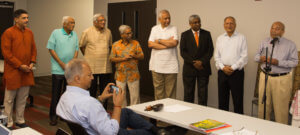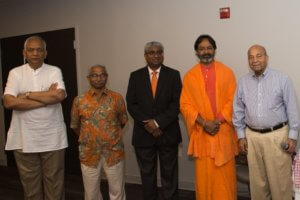To read the Part 1 of this blog, click here.
Averting the dangers of pleasure-driven actions
“एतज्ज्ञेयं नित्यमेवात्मसंस्थं नातः परं वेदितव्यं हि किञ्चित् । भोक्ता भोग्यं प्रेरितारं च मत्वा सर्वं प्रोक्तं त्रिविधं ब्रह्ममेतत् ॥
This is to be known as eternally existing in one’s own Self. Truly there is nothing higher than that to be known. When one recognizes the enjoyed, the object of enjoyment, and the dispenser or the supreme Ruler, all has been said. This is a threefold Brahman.”
~ Shvetasvatara 1.12
Not knowing oneself is the most incredible ignorance, and it is this ignorance that drives us toward desire-fulfilling actions. The greatest ignorance is only overcome by the greatest knowledge. Knowing the self as Ātma with a body and not vice-versa is the first step in removing the veil of ignorance.
Understanding the perfection, limitlessness, brilliance, timelessness, and indestructibility of the Ātma brings the understanding that the Self is infinite and complete within the Self. Knowing the Ātma as (part of) Brahman brings the knowledge that there is no lack.
“एवमेव खलु सोम्येमाः सर्वाः प्रजाः सत आगम्य न विदुः सत आगच्छामह इति त इह व्याघ्रो वा सिंहो वा
वृको वा वराहो वा कीटो वा पतङ्गो वा दंशो वा मशको वा यद्यद्भवन्ति तदाभवन्ति ॥
In the same way, O Somya, all these beings, having come from Sat [Brahman], never know this. They never think, ‘We have come from Sat.’ Whatever they were before in this world—whether a tiger or lion or leopard or boar or bug or insect or flea, or mosquito—they are born again according to their karma. They never know that they came from Sat.”
~Chandogya 6.10.2
When there is no lack, when there is completeness, the pursuit of anything becomes unnecessary.
Desire develops when there is a need, the need arises when there is the perception of scarcity, and scarcity appears when there is incompleteness. That I am full, satisfied, and complete means that nothing external is necessary.
When food satisfies hunger, that is transient enjoyment. When a drink quenches thirst, that is passing pleasure. While both are necessary for survival, neither is sufficient for long-term ānanda (bliss). When there is no deficit and no need to be fulfilled, this is contentment which brings long-term gratification beyond the fleeting perceptions of happiness and distress.
“प्रणो ह्येष यः सर्वभूतैर्विभाति विजानन् विद्वान् भवते नातिवादी ।
आत्मक्रीड आत्मरतिः क्रियावा- नेष ब्रह्मविदां वरिष्ठः ॥
Truly it is the life that shines forth in all beings. Knowing him, the wise man does not talk of anything else. Sporting in the self, delighting in the self.”
~ Mundaka Upaniṣad 3.1.4
That I am complete within myself means there is no desire. Therefore, there is no expectation or disappointment. That my happiness is not dependent on other things but is instead in me means that my constant pleasure-seeking actions can end. This leads to natural tranquility and peace. Therefore, the first danger is averted as the external world loses its ability to frustrate me.
Understanding the limited nature of the jagat and śarira (which are time bound and subject to change) and the simultaneous limitlessness of the Ātma and Brahman (which are timeless and constant) nurtures a non-reliance on the external world for happiness. The result is vairāgya or detachment. Vairāgya is the beginning of the end of one’s entrapment in samsāra. As the futility of a thing is understood—that neither happiness nor sorrow can genuinely be derived from it—vairāgya grows.
Happiness comes from realizing that the colossal Brahman exists within the Self, and as such, I am already in bliss. Through this knowledge, the fulfillment of Śreyas also means the automatic achievement of Preyas. Therefore, there is no need to pursue joy or avert sorrow, as I am already all that I seek.
“तं दुर्दर्शं गूढमनुप्रविष्टं गुहाहितं गह्वरेष्ठं पुराणम् ।
अध्यात्मयोगाधिगमेन देवं मत्वा धीरो हर्षशोकौ जहाति ॥
Raising through self-contemplation that primal god, difficult to be seen, deeply hidden, set in the cave (of the heart) dwelling in the deep, the wise man leaves both joy and sorrow.”
~ Kathopanishad 1.2.12
Does niṣkāmakarma mean I should not act, or I may act carelessly?
Since I am already complete and require nothing, and since my actions should be performed without desire, why should I act? If I should not be attached to the fruit of karma or concerned about its consequences, then does desireless action mean that I can act irresponsibly without thinking about the effects of those actions? Vedānta teaches that one must not forget the reason behind all actions.
The Bṛhadāraṇyaka Upaniṣad states that nothing is higher than Dharma. The Sanskrit word “dharma”: is rooted in the Sanskrit “dhṛ,” meaning to hold or support.
“धर्मः तस्माद्धर्मात् परं नास्त्य् अथो अबलीयान् बलीयाँसमाशँसते धर्मेण यथा राज्ञैवम् ।
यो वै स धर्मः सत्यं वै तत् तस्मात्सत्यं वदन्तमाहुर् धर्मं वदतीति धर्मं वा वदन्तँ सत्यं वदतीत्य् एतद्ध्येवैतदुभयं भवति ।।
Nothing is higher than dharma. The weak overcome the stronger by dharma, as over a king. Truly that dharma is the Truth (Satya); Therefore, when a man speaks the Truth, they say, “He speaks the Dharma,”; and if he speaks Dharma, they say, “He speaks the Truth!” For both are one.”
~ Bṛhadāraṇyaka Upaniṣad, 1.4.xiv
Man must act in accordance with Dharma. In his introduction to his Bhāṣya for the Bhagavad Gītā, Ādi Śankaracarya states that the jagat was created, and then Dharma was conveyed to humankind for its (the jagat’s) stability.
“Having created the cosmos and seeking to ensure its existence, the Lord brought forth in the beginning the Prajaapatis [progenitors], Marici and the rest. Then He imparted to them the Vedic law of works… The law of righteousness [Dharma] is what directly promotes the prosperity and emancipation of living beings. It is cultivated in the pursuit of progress by classes of men, set in different stations of life.”
Therefore, the principle of niṣkāmakarma does not advocate that one may forsake his duty within the jagat but must act according to varnāśrāmadharma. What changes is not the quality or quantity of the action. What changes is the mindset—that one has neither control nor attachment to the outcome.
When one develops this mindset and achieves the consequent freedom, the status of jīvanmukta is achieved while embodied, and moksha after the Ātma drops the body.
“यदा सर्वे प्रभिद्यन्ते हृदयस्येह ग्रन्थयः ।
अथ मर्त्योऽमृतो भवत्येतावद्ध्यनुशासनम् ॥
When all the knots of the heart are destroyed even while a man is alive, then a mortal becomes immortal. This much alone is the instruction.”
~ Kathopaniṣad 2.3.15
Action cannot be avoided. Therefore, niṣkāmakarma is the answer.
Whether consciously or not, karma is performed as long as we are embodied within the world. Does that mean that our actions should not be purposeful? We must differentiate between acting with intention versus acting with attachment. Working with purpose within Dharma and as an act of service to Īśvara and His creation does not bind.
The results of our actions depend on the desire or detachment with which those actions are performed. As selfish desires, they can entrap us as kāmakarma. As actions of service without attachment to the results, they free us as niṣkāmakarma.
The differentiation is the mindset with which the action is performed. The thought that I am the body and the doer keeps me trapped in samsāra.

Illustration 2 – Attachment to fruits of kāmakarma keeps one trapped in samsāra.
The proper understanding of the Self, as already complete, limitless, and without lack, frees me from the frustrations of attachment to desires in this life and the cycle of transmigration thereafter.

Illustration 3 – Niṣkāmakarma frees one from samsāra.
Niṣkāmakarma, therefore, is the result of parāvidya and a prerequisite for mokśa. It brings mental peace and contentment while on earth and freedom from the dangers of rebirth thereafter.
“कामान् यः कामयते मन्यमानः स कामभिर्जायते तत्र तत्र ।
पर्याप्तकामस्य कृतात्मनस्तु इहैव सर्वे प्रविलीयन्ति कामाः ॥ २॥
He who entertains desires, thinking of them, is born (again) here and there on account of his desires. But of him who is fully satisfied, who is a perfected soul, all his desires vanish even here (on earth).”
~ Mundaka Upaniṣad (3.2.2)










